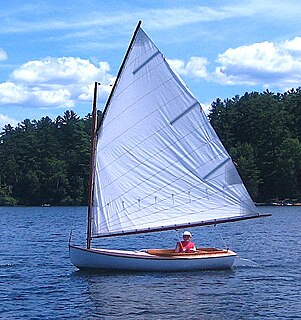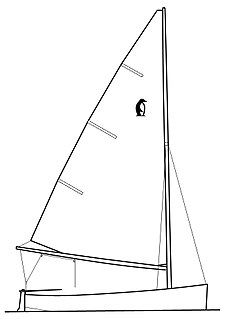Related Research Articles
The El Toro is an American pram sailboat that was designed by Charles McGregor as a sail training dinghy and yacht tender, first built in 1939. It is now often sailed as a singlehanded one-design racer.

The Beetle Cat is an American one-design sailing dinghy that was designed by John Beetle and first built in 1921. It is a smaller adaptation of traditional Cape Cod 20 to 30 ft catboat designs originally intended for fishing in shallow waters.

The Vanguard 15 is an American sailing dinghy that was designed by Bob Ames as a one-design racer and first built in 1992.

The Windmill is an American sailing dinghy that was designed by Clark Mills as a one-design racer and first built in 1953.

The Penguin is an American sailing dinghy that was designed by Philip Rhodes in 1933 as a one design racer for frostbite racing on the US east coast and first built in 1939.

The Banshee, sometimes called the Banshee 13, is an American sailing dinghy that was designed by Richard L. Reid as a one-design racer and first built in 1969.

The Bombardier Invitation is a Canadian sailing dinghy that was designed by Bombardier Research to compete in the same market with the Laser, as a one-design racer. It was first built in 1973.
The Blue Crab 11, also called the Gloucester 11, is an American utility dinghy that can be rowed, used as a motorboat or as a sailing dinghy. It was designed by Harry R. Sindle and first built in 1971. The design is named for the family of crustaceans.
The Interclub Dinghy is an American sailing dinghy that was designed by Sparkman & Stephens as a one-design racer and first built in 1946. It is sailed in frostbite racing on the US east coast, particularly on Long Island Sound. Frostbite races are the series held after the normal sailing season is finished.

The Echo 12 is a Canadian rowboat, motorboat and sailing dinghy that was first built in 1979.
The Puffer is an American rowboat, motorboat and sailing dinghy that was designed by Fred Scott and first built in 1972.
The Capri Cyclone, also referred to as the Cyclone 13 or just the Cyclone, is an American sailing dinghy that was designed by Frank V. Butler as a one-design racer and first built in 1970.
The Barnett 1400 is an American sailing dinghy that was designed by Ron Hedlund and Gerry Hedlund as a one-design racer and first built in 1989.
The Phantom 14 is an American sailing dinghy that was designed by Jack Howie as a racer and first built in 1977. It is a board sailboat, similar to the Sunfish.
The Nacra 5.2 is an American catamaran sailing dinghy that was designed by Tom Roland as a one-design racer and first built in 1975. Other that the small production run Nacra 36, the Nacra 5.2 was the first Nacra brand boat and established its reputation.
The Dolphin 15 Senior, sometimes referred to as just the Dolphin Senior, is an American sailing dinghy that was designed by brothers Glenn Corcoran and Murray Corcoran and first built in 1964.
The Cape Cod Mercury 15, also called the Mercury Sloop and just the Mercury, is an American trailerable sailboat and sailing dinghy, that was designed by Sparkman & Stephens and first built in 1940.
The Lehman 12 is an American sailboat that was designed by Barney Lehman as a one design racing sailing dinghy and first built in 1953.
The Lehman Interclub is an American sailboat that was designed by Barney Lehman as a one design racer and first built in 1958.
The US Sabot is an American pram sailboat that was designed by Charles McGregor as a one-design racer and first built in 1939.
References
- 1 2 3 4 5 McArthur, Bruce (2020). "Cape Cod Frosty sailboat". sailboatdata.com. Archived from the original on 3 June 2020. Retrieved 2 June 2020.
- 1 2 3 4 5 6 7 Sherwood, Richard M.: A Field Guide to Sailboats of North America, Second Edition, pages 2-3. Houghton Mifflin Company, 1994. ISBN 0-395-65239-1
- 1 2 3 Cape Cod Frosty Class Association (2001). "World's Smallest Racing Dinghy!". capecodfrosty.org. Archived from the original on 2 June 2020. Retrieved 2 June 2020.
- ↑ McArthur, Bruce (2020). "Cape Cod Frosty Class Association". sailboatdata.com. Archived from the original on 2 June 2020. Retrieved 2 June 2020.
- ↑ Cape Cod Frosty Class Association (2001). "Building or Buying a Frosty". capecodfrosty.org. Archived from the original on 2 June 2020. Retrieved 2 June 2020.
- ↑ Cape Cod Frosty Class Association (2001). "Cape Cod Frosty Class Championship". capecodfrosty.org. Archived from the original on 2 June 2020. Retrieved 2 June 2020.
- ↑ Cape Cod Frosty Class Association (2001). "Fleets". capecodfrosty.org. Archived from the original on 2 June 2020. Retrieved 2 June 2020.